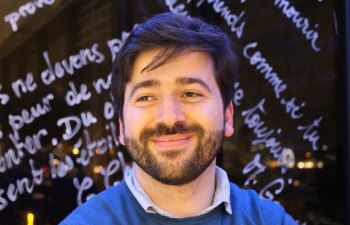Andre Maia Chagas: “I hope to help more minds work on humanity’s most interesting and pressing questions”
Posted on behalf of: Internal Communications
Last updated: Monday, 9 June 2025

Dr Andre Maia Chagas, Lecturer in Open Science & Scientific Officer within Sussex Neuroscience, recently won the Open Research category at the Sussex Awards 2025 for his work creating and sharing open-source hardware for research and teaching others to produce their own tools and equipment. He also helps our University’s sustainability efforts, and all Sussex Award winners were presented with a trophy depicting the Arts A pillars, 3D printed on campus using recycled plastics by Andre and his team. We hear from Andre about the work that led to his award win – and how it could have a real-world impact on the lives of people around the globe.
My work focuses on Open Science, with special emphasis on open-source hardware and its potential to democratize research and education. In other words, I develop tools and equipment for experimental research. The ‘open’ element is what sets our work apart from traditional tools developers. All of our designs, blueprints and assembly instructions are made freely available for everyone to learn from, copy, modify and even commercialise. The impact of this type of development is that our tools are normally much more affordable than commercial counterparts. This is because they’re much easier to adapt, improve and customise, speeding up research cycles and allowing researchers to have much more precise control over the experiments they perform and the data they collect.
I hope my research will help level the playing field in terms of access to tools needed to perform cutting edge research. This way, we all win. If more researchers can access these types of tools, we will have more and more minds working on humanity's most interesting and pressing questions, hopefully leading to societal improvement and better living conditions around the globe.
I enable academics to start designing and customising their own tools to perform interesting and important experiments. I have organised or taught in many open-source development workshops at Sussex and internationally, mostly in institutions in Africa, since starting at the University seven years ago. My colleagues and I have shared skills and knowledge on how to use open knowledge, fast prototyping tools (such as 3D printers, laser cutters and computer numerical control machines), electronics, and programming with academics at all career levels. All of this is done in collaboration with TReND in Africa, an NGO I have volunteered with since 2014. Alumni from the course have now published their own papers describing tools they’ve developed. They have also organised their own workshops where they then taught the same skills they learned to their colleagues.
I love that Sussex sits within a green parkland on the edge of the South Downs. But what I find really great about being at the University is my colleagues in Sussex Neuroscience and the opportunity I've had to develop my work.
A good book is always a winner to help me relax, and I also enjoy learning about new technology. With a small kid at home, there is little time for hobbies - I always have an eye out for the next thing to do, event to organise or appointment to get to! In the future I’d love to travel more in South America (where I’m originally from) and learn how to sail.
